
A Quick Guide to Your Baby’s Speech and Language Development – 6 to 12 Months
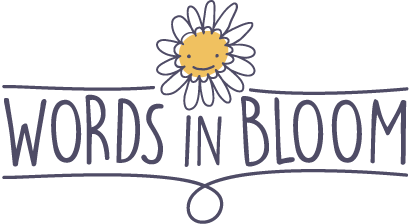 Speech and Language Milestones
Speech and Language Milestones
By 12 months, your baby:
- babbles using different sounds like “ma,” “muh,” “da,” and “ba”
- takes turns making sounds with you
- understands “no”
- looks across the room to something you point to, such as a toy or ball
- gets your attention using sounds, gestures and pointing while looking at your eyes
- uses gestures to communicate, for example, waves “bye-bye” or shakes head “no”
- uses an expressive vocabulary of 2 to 8 words, for example, “no,” “baby,” “bye-bye,” or “hi”
- shows interest in simple picture books
- understands their own name
- understands some words with gestures (“bye-bye” and wave, “give me” and open hand)
- points to some body parts when asked
- starts to understand simple commands (sit down, don’t touch)
- searches for the source of a sound such as the doorbell or telephone
- tries to sing along with music
- lets you know what they want using sounds, and/or actions like pointing
- pays attention when spoken to
A referral to the Words in Bloom program may be needed if your child is not meeting most of these milestones.
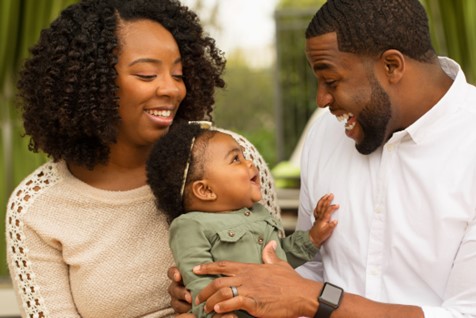
Building Blocks for Developing Your Baby’s Speech and Language Skills
- Give your baby many opportunities to see your face during your regular routines. Your baby can pay attention to you and you can see what they are interested in, allowing you to give words to what they are looking at.
- Give words to objects and actions.
- Encourage the use of gestures and pair gestures with words when modeling.
- Use single words when labeling and short and simple sentences to add information.
- Name the pictures in a book. This is a great way to build vocabulary.
- Repeat! Repeat! Repeat! Your baby needs to hear words many times before they understand or says them.
- Encourage babbling by copying your baby’s sounds.
- While you are out with your baby, talk about what you are doing and seeing. Babies need a variety of experiences to learn and grow.
The Importance of Play
Play is the most enjoyable way to promote your baby’s speech and language skills.
- Babies are either sitting up or on the move at this stage. Toys that allow them to explore through taste, touch, and sound as well as vision will grab their attention.
- Babies learn best through face-to-face interactions. Play at the same level as your baby. If your baby is down on the floor, join them or bring them up to your level.
- Babies enjoy adult attention in games such as pat-a-cake, peek-a-boo, and tickle games.
- Babies enjoy looking at picture books, especially books with sounds, textures, or doors to open.
- Babies will take turns in familiar games with adults (banging on pots, stacking and knocking down blocks, dumping out containers).
- Babies like looking in mirrors - this is a great time to talk about body parts and practice names.
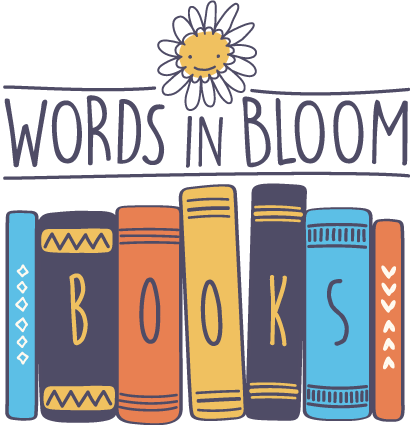 BOOKS
BOOKS
Best Book Types:
- Board books
- Plastic books
- Cloth books
- Touch and feel books
- Books with bright pictures of familiar things
- Objects (like toy food or animals) can be paired with books to make language learning more concrete.
Observe Your Child:
- Even though they may not be interested in the words of the story, they enjoy the special time with you.
- First your baby will explore books the same way they explore toys (by chewing, throwing, banging, shaking, feeling, squeezing, opening, and closing them).
- Later, your baby will start to focus on the pages by taking an interest in pictures and by turning the pages.
Opt to Join In:
- Encourage your baby to explore the book in her own way.
- Let your baby chew, shake, and bang the book.
- Watch him closely to see what they are looking at (face your baby).
- Name the pictures you and your baby see.
Kee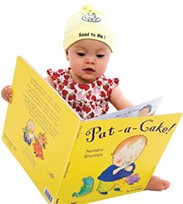 p Having Fun:
p Having Fun:
- Use an animated and playful voice.
- Let your baby be in charge of the book.
- Play with a favourite book over and over again.
- Add book reading to your daily routine.
Some Suggestions:
- Row, Row, Row Your Boat by Annie Kubler
- Moo Baa La La La (Board Book) by Sandra Boynton
- Baby Talk (A Lift-the-Flap Board Book) by Dawn Sirett
- Eyes, Nose, Toes Peekaboo! (Board Book) by Dorling Kindersley Publishing
Did You Know?
- Babies love looking at faces. Make a game of funny faces or silly sounds and see if your baby copies you. You can copy them too!
- Babies enjoy spending time with other babies! Try a local playgroup that has special times for parents with babies or set up a playdate with a friend who also has a baby.
- Songs that have simple melodies and repeated words can help your baby pay attention to the tone, rate, and rhythm of your voice as well as to the words you sing.
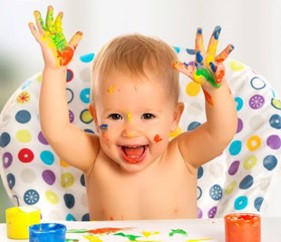 Frequently Asked Questions
Frequently Asked Questions
Q: Are there any special apps or tv shows that will help with language learning?
A: The best way for your baby to learn language is through you! Watching how you talk and use facial expressions is a natural way to learn how to communicate.
Q: When should my baby start talking?
A: Babies’ first words are usually heard around their first birthday (which is often when they start to walk as well). Before this, they will be making lots of different sounds that may sound like words, and using gestures like pointing and waving.
Q: Should I worry if my baby is very quiet?
A: Your baby should be making and consistently responding to different sounds at this stage. Talk to your baby’s doctor about having their hearing tested if you are concerned.
If you suspect your child is having difficulty communicating, don’t wait! Follow your instincts. Friendly, confidential help is only a call away.
Contact Words in Bloom by calling the EOHU at 613-933-1375 or at 1-800-267-7120.

